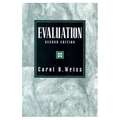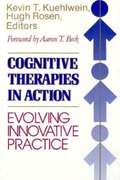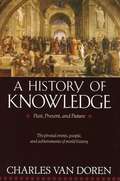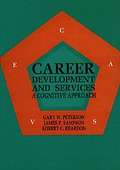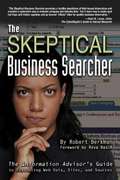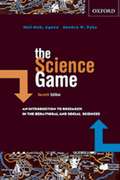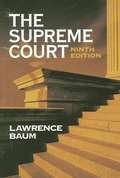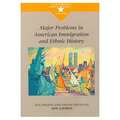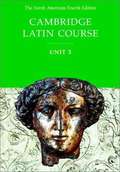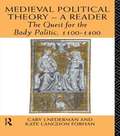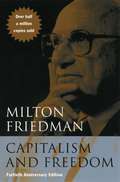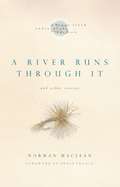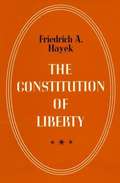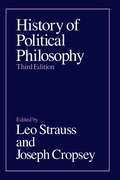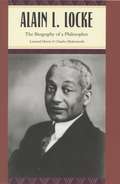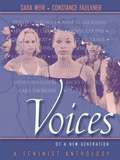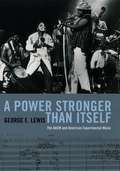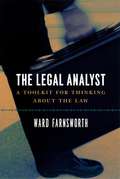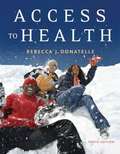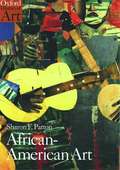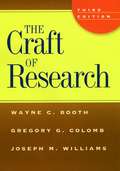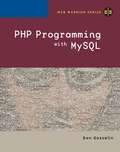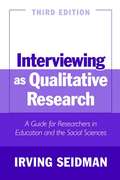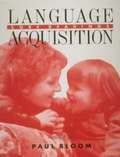- Table View
- List View
Evaluation: Methods for Studying Programs and Policies
by Carol H. WeissThis timely and accessible guide on the conduct of evaluation studies explores how we apply research methods in evaluating social programs, illustrating its points with reference to a variety of fields, including education, social services, and criminal justice. Offers practical advice on understanding the reasons for the study, identifying key questions to be answered, and planning and implementing the overall design of the study, including measurement, qualitative methods of inquiry, data collection, analysis, reporting, and dissemination. Stresses that understanding the underlying theory of the program is essential to developing the most appropriate evaluation, and emphasizes the need to take ethical considerations into account all along the course of the study. Covers meta-analysis, cost-benefit analysis and includes a non-technical discussion of the logic of data analysis. Includes references to further sources on measurement, existing longitudinal data sets, statistics, and qualitative analysis. For professionals in psychology, sociology, public health, public policy/affairs, education, and criminal justice.
Cognitive Therapies in Action: Evolving Innovative Practice
by Kevin T. Kuehlwein Hugh RosenOffers an overview of the broad range of cognitive therapeutic approaches, including state-of-the-art innovations. The authors present extensive case examples to demonstrate how to apply these therapy models to a range of clients, including those suffering from psychoses and personality disorders.
A History of Knowledge: Past, Present, and Future
by Charles Van DorenA one-volume reference to the history of ideas that is a compendium of everything that humankind has thought, invented, created, considered, and perfected from the beginning of civilization into the twenty-first century. Massive in its scope, and yet totally accessible, A HISTORY OF KNOWLEDGE covers not only all the great theories and discoveries of the human race, but also explores the social conditions, political climates, and individual men and women of genius that brought ideas to fruition throughout history. "Crystal clear and concise... Explains how humankind got to know what it knows." Clifton Fadiman.
Career Development and Services: A Cognitive Approach
by Gary W. Peterson James P. Sampson Robert C. ReardonThe purpose of this text is to enable practitioners and future practitioners to establish career development services that will assist clients in developing their abilities to use self-knowledge and career information to solve career problems and to make decisions wisely. The text is based on cognitive information processing theory, a comprehensive paradigm derived from a rapidly expanding theoretical and research base in cognitive psychology. The book was written expressly to join theory and practice by taking a comprehensive psychological theory and logically extending its implications to the theory and practice of career development. We have made a concerted effort to design a book that can be used as a classroom text as well as a field guide for practice.
The Skeptical Business Searcher: The Information Advisor's Guide to Evaluating Web Data, Sites, and Sources
by Robert BerkmanFocusing on free sources, Berkman (editor of The Information Advisor newsletter) arms business searchers with techniques for finding reliable, accurate company and industry data on the Web. He covers strategies to use before turning to a Web search engine (libraries, pre-screened sources, indexes and directories, weblogs) but also has plenty to say about effective use of search engines themselves. He provides tips on evaluating information for reliability and bias, and discusses big-picture topics like building up personal knowledge and search intuition. Annotation ©2004 Book News, Inc., Portland, OR (booknews.com)
The Science Game: An Introduction to Research in the Behavioural and Social Sciences (7th edition)
by Neil Mckinnon Agnew Sandra W. PykeUsing quirky and sometimes irreverent examples to provide an overview of social science methodology, this new edition of the popular text has been substantially revised to include an in-depth consideration of current hot topics in the constantly evolving field of scientific research, including the trend away from 'hard' (quantitative) research to 'soft' (qualitative) research, advances in computerized analysis of statistical data, and the increasing focus on the cultural context of research. Part One explores the strengths and limitations of common sense methods of solving puzzles and demonstrates how the scientific method significantly improves our ability to check the reliability and validity of theories. Part Two introduces the reader to two pre-scientific methods of problem solving: the after-the fact and the before-and- after methods. After noting the strengths and limitations of these pre-scientific methods, the authors explain how the control-group procedure, the classic example of the scientific method, helps overcome the major limitations of the after-the-fact and before-and-after methods. Part Three explores how scientists measure the internal and external validity of research results. Part Four examines the methods scientists use to assess subjective information through qualitative research methods: questionnaires, interviews and attitudes and personality scales. Naturalistic observations and archival research extend the reach of social sciences into areas that more controlled research methods cannot go. Part Five sets out the basic rules for tying numbers to objects and events, how numbers can be used to summarize and describe large amounts of information, and how mathematics helps us to bridge the gap between the known and the unknown. Part Six charts an explosion of ethical challenges as science pushes its way into every nook and cranny of our lives. Chapter Fourteen focuses on how scientists may communicate their scientific news clearly and effectively. Part Seven engages in a wide-ranging discussion of the history of science and explore how gender influences scientific research.
Diversity in Sport Organizations
by George B. CunninghamWriting for undergraduate and graduate students, Cunningham (sport management, Texas A&M U.) discusses how diversity affects sports organizations, devoting attention to aspects of race, sex and gender, age, disability, obesity, religion, sexual orientation, and social class. Following an overview of diversity, approaches to its study, and an examination of prejudice and discrimination, he details compositional and relational types, and ways to manage workplace diversity. Both author and subject indexes are included. Annotation ©2007 Book News, Inc., Portland, OR (booknews.com)
The Supreme Court (9th edition)
by Lawrence BaumBaum (political science, Ohio State U.) presents a short guide for readers who know a lot or a little about the highest court in the US. No dates are noted for earlier editions; this one reflects new scholarship and developments such as the Bush v. Gore case and its repercussions. Cited in Books for College Libraries, 3d. ed. Annotation ©2004 Book News, Inc., Portland, OR (booknews.com)
Major Problems in American Immigration and Ethnic History
by Jon GjerdeThis unique volume explores such themes as the political and economic forces that cause immigration; the alienation and uprootedness that often follow relocation; and the difficult questions of citizenship and assimilation.
Cambridge Latin Course, Unit 3
by Stephanie Pope Patricia E. Bell Stan Farrow Richard M. Popeck Anne Shaw Joy Mellor Leslie Jones Peter Kesteven Neil SuttonThe North American Cambridge Latin Course is a well-established four-part Latin program whose approach combines a stimulating, continuous storyline with grammatical development, work on derivatives, and cultural information. There is also a complete Language Information section, plus numerous color photographs illustrating life in the Roman world. The Course has now been fully revised and updated in the light of feedback from user schools, and includes the very best in new research. The Fourth Edition continues to offer teachers and students alike a stimulating, reading-based approach to the study of Latin.
Medieval Political Theory: The Quest for the Body Politic, 1100-1400
by Cary J. Nederman Kate L. ForhanA textbook anthology of important works of political thought revealing the development of ideas from the 12th to the 15th centuries. Includes new translations of both well-known and ignored writers, and an introductory overview.
Capitalism and Freedom (40th Anniversary Edition)
by Milton Friedman Rose D. FriedmanHow can we benefit from the promise of government while avoiding the threat it poses to individual freedom? In this classic book, Milton Friedman provides the definitive statement of his immensely influential economic philosophy -- one in which competitive capitalism serves as both a device for achieving economic freedom and a necessary condition for political freedom. The result is an accessible text that has sold well over half a million copies in English, has been translated into eighteen languages, and shows every sign of becoming more and more influential as time goes on.
A River Runs Through It and Other Stories (25th Anniversary Edition)
by Norman MacleanThe two novellas and short story in this collection are based on Maclean's own experiences -- the experiences of a young man who found that life was only a step from art in its structures and beauty. The beauty he found was in reality, and so he leaves a careful record of what it was like to work in the woods when it was still a world of horse and hand and foot, without power saws, "cats", or four-wheel drives. Populated with drunks, loggers, card sharks, and whores, and set in the small towns and surrounding trout streams and mountains of western Montana, the stories concern themselves with the complexities of fly fishing, logging, fighting forest fires, playing cribbage, and being a husband, a son, and a father.
The Constitution of Liberty
by Friedrich A. HayekIn this classic work Hayek restates the ideals of freedom that he believes have guided, and must continue to guide, the growth of Western civilization. Hayek's book, first published in 1960, urges us to clarify our beliefs in today's struggle of political ideologies.
History of Political Philosophy (Third Edition)
by Leo Strauss Joseph CropseyWritten by specialists on the various philosophers, this third edition has been expanded significantly to include both new and revised essays.
Alain L. Locke: Biography of a Philosopher
by Leonard Harris Charles MolesworthAlain L. Locke (1886-1954), in his famous 1925 anthology "The New Negro", declared that "the pulse of the Negro world has begun to beat in Harlem". Often called the father of the Harlem Renaissance, Locke had his finger directly on that pulse, promoting, influencing, and sparring. Leonard Harris and Charles Molesworth trace Locke's story through his Philadelphia upbringing, his undergraduate years at Harvard and his tenure as the first African American Rhodes Scholar. The heart of their narrative illuminates Locke's heady years in 1920s New York City and his forty-year career at Howard University, where he helped spearhead the adult education movement of the 1930s and wrote on topics ranging from the philosophy of value to the theory of democracy. Harris and Molesworth show that throughout this illustrious career -- despite a formal manner that many observers interpreted as elitist or distant -- Locke remained a warm and effective teacher and mentor, as well as a fierce champion of literature and art as means of breaking down barriers between communities. The multifaceted portrait that emerges from this engaging account effectively reclaims Locke's rightful place in the pantheon of America's most important minds.
Voices of a New Generation: A Feminist Anthology
by Sarah Weir Constance FaulknerA new generation of feminist thinkers from a variety of nonacademic and academic backgrounds including women's studies, anthropology, ethnic studies, and geography, address current issues in feminism. Weir and Faulkner (Western Washington U.) formed the anthology to provide their students with voices, viewpoints, and diversity missing from their regular textbooks. The 18 essays offer ways of understanding how younger women see themselves in the 21st century. Annotation ©2004 Book News, Inc., Portland, OR (booknews.com)
A Power Stronger Than Itself: The AACM and American Experimental Music
by George E. LewisFounded in 1965 and still active today, the Association for the Advancement of Creative Musicians (AACM) is an American institution with an international reputation. From its working-class roots on the South Side of Chicago, the AACM went on to forge an extensive legacy of cultural and social experimentation, crossing both musical and racial boundaries. The success of individual members and ensembles such as Muhal Richard Abrams, the Art Ensemble of Chicago, and Anthony Braxton has been matched by the enormous influence of the collective itself in inspiring a generation of musical experimentalists. George E. Lewis, who joined the collective as a teenager in 1971, establishes the full importance and vitality of the AACM with this communal history, written with a symphonic sweep that draws on a cross-generational chorus of voices and a rich collection of rare images. Faced with shrinking economic opportunities in Chicago and a segregated music industry, the original members of the AACM found inspiration in the civil rights movement's call for change through self-determination and collective action. These musicians pooled their individual strengths in a new organization powerfully committed to a forward-thinking approach to musical creation and performance. Evolving a range of experimental methods, from invented instruments and unusual musical scores to improvisation and the early use of computers, the AACM challenged the borders separating classical music and jazz.
The Legal Analyst: A Toolkit for Thinking about the Law
by Ward FarnsworthDrawing on economics, game theory, psychology, jurisprudence, and other fields. Ward Farnsworth's "The Legal Analyst" is a fascinating guide to tools for thinking about the law. Every idea is taught step-by-step, explained in clear, lively language, and illustrated with telling examples. The result is an indispensable book for law students, lawyers, scholars, and anyone else interested in legal questions.
Access to Health (10th edition)
by Rebecca J. DonatelleDonatelle (public health, Oregon State University) challenges undergraduate students to think globally as they consider health risks and personal health decisions. New opportunities for self-assessment and behavior change are offered in this edition, in the form of behavior change contracts and boxes on tattoos, safer sex, and club drugs. There is expanded information on the mind-body connection and alternative medicine, as well as new coverage of contraceptive devices and weight management. Annotation (c)2003 Book News, Inc., Portland, OR (booknews.com)
African-American Art
by Sharon F. PattonFrom its origins in early 18th century slave communities to the end of the 20th century, African-American art has made a vital contribution to the art of the United States. This book provides a major reassessment of the subject, setting the art in the context of the African-American experience.
The Craft of Research (3rd edition)
by Wayne C. Booth Gregory G. Colomb Joseph M. WilliamsWith more than 200,000 copies in print, The Craft of Research is the unrivaled resource for researchers at every level, from first-year undergraduates to research reporters at corporations and government offices. Now, seasoned researchers and educators Gregory G. Colomb and Joseph M. Williams present an updated third edition of their classic handbook, whose first and second editions were written in collaboration with the late Wayne C. Booth. The Craft of Research explains how to build an argument that motivates readers to accept a claim; how to anticipate the reservations of readers and to respond to them appropriately; and how to create introductions and conclusions that answer that most demanding question, "So what?"
PHP Programming with MySQL
by Don GosselinAs the first true academic textbook in the market to combine PHP with MySQL, PHP Programming with MySQL, by Don Gosselin covers one of the fastest growing technology combinations for developing interactive Web sites.
Interviewing as Qualitative Research: A Guide for Researchers in Education and the Social Sciences (3rd edition)
by Irving SeidmanThe third edition of this bestselling resource provides clear, step-by-step guidance for new and experienced interviewers to help them develop, shape, and reflect on interviewing as a qualitative research process.
Language Acquisition: Core Readings
by Paul BloomLanguage Acquisition offers, in one convenient reader, work by the most outstanding researchers in each field and is intended as a snapshot of the sort of theory and research taking place in language acquisition in the 1990s.
